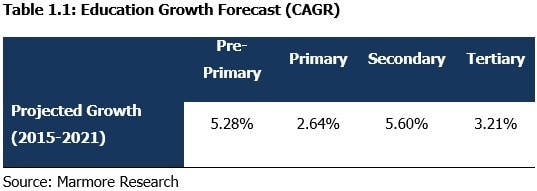International players fuel the growth of private education in UAE

Marmore Team
08 March 2016
The Education system is divided into 4 levels
- K-12 Education (Kindergarten, primary and secondary education)
- Higher Education
- Technical Education
- Special Education (Differentially abled students)
Government has encouraged education by providing free education to Emirati students while charging nominal fees for expatriate students. The gross enrolment ratio for the primary education is comparable to the world average.
According to Marmore’s UAE Education report, the Ministry of education has come up with education development plan 2015 to 2021 for the development of the education sector. The initiatives are directed towards educating the rising population as well as increasing foreign investment. The UAE federal government introduced a set of seven initiatives which is aimed at improving the R&D capabilities and innovation. The UAE Vision 2021 National Agenda emphasizes the development of a first-rate education system, which will require a complete transformation of the current education system and teaching methods. There is increase in disposable income per capita in the UAE. Increased income coupled with preference for quality education and increasing population increases the demand for better schools. Government has allocated USD 272 million towards the smart learning project, which aims to equip all public schools in the UAE with tablets and high speed 4G connectivity.
In 2012, 70% private schools in Abu Dhabi were oversubscribed. With rising population, the number of applicants in private schools is likely to rise. Keeping this demand in mind, the ADEC has offered cheap land to private schools in Abu Dhabi. The increase in population gives rise to demand for education. According to Abu Dhabi Education Council (ADEC), there will be a shortage of 25,000 seats in academic year 2015-16.
We have taken into consideration the past growth population growth rate and enrolment rate and have forecasted the enrolments for the next 7 seven years. The projection model also takes into consideration the literacy rate and the public expenditure as a % of GDP while forecasting these numbers.

As per the KHDA, there will be huge need for vocational education in future as Dubai grows. Their study estimates that UAE will have a labour shortage of about 200,000 by end of 2015 and thus key industries would require huge workforce. To address this demand supply gap, QAD (Qualification and Awards in Dubai) will develop qualifications recognized by the National Qualification Authority and the Vocational Education and Training Awards Council.
Education in UAE is not without its own challenges. While the demography is usually favourable, UAE experiences a lot of expat inflows and outflows resulting in huge turnover of students as well making it difficult to anticipate the demand. Construction cost is high in UAE; this combined with a cap on fees exacerbates the problem potentially keeping investors at bay.
Government of Dubai however has been making huge strides in order to promote its country as a knowledge based society. One such example is the Dubai International Academic City (DIAC) is the world’s largest Free Zone dedicated to Higher Education. DIAC boasts of multi-tiered International Branch Campuses (IBC's), from 10 different countries and to cater to about 20,000 students of 125 nationalities with choice of pursuing over 400 Higher Education programs.
Stay Tuned To Marmore MENA Insights!
Never miss a patch or an update with Marmore's Newsletter. Subscribe now!
Related Article
The uptick in MENA Eurobond issuances – A sign of things to come?
MENA debt issuances have touched record highs in Q1 2025. Will the uptick continue in subsequent quarters?
Read MoreKuwait’s Approval of Public Debt Law: Re-emerging on Investors’ Radar
Kuwait has passed the long-awaited debt law in March 2025. The blog explores the importance of the law, the expected benefits and outlook for the countrys return to debt markets.
Read MoreThe Dynamic Rise of Fintech in the GCC
The convergence of technology and finance is reshaping the GCC Financial Ecosystem. The blog explores key players, regulatory framework and market dynamics of Fintech in the GCC region.
Read MoreTags
No Tags!




